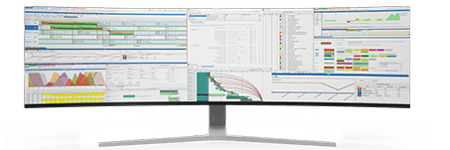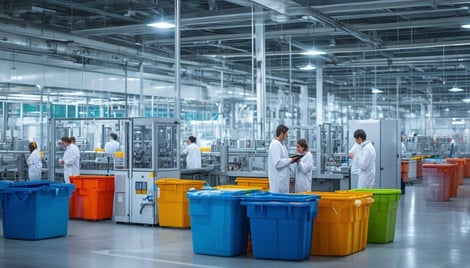Transforming Medical Waste Management with Advanced Systems Integration
Waste management often takes a backseat to production and compliance concerns . However, the stakes associated with improper waste handling in medical manufacturing—ranging from regulatory fines to environmental harm—necessitate a proactive approach. For Operations Directors, managing waste isn’t just about compliance; it’s a strategic opportunity to reduce costs, enhance sustainability, and streamline operations.
Leveraging modern technology, specifically the integration of PlanetTogether APS (Advanced Planning and Scheduling) with enterprise solutions like SAP, Oracle, Microsoft Dynamics, Kinaxis, or Aveva, is a game-changer. This integration provides powerful tools to optimize resource use, minimize waste, and establish a forward-thinking medical waste management strategy.

The Unique Challenges of Medical Waste in Manufacturing
Medical manufacturing facilities face unique waste management challenges, including:
Complex Waste Streams: From biohazardous materials to chemical byproducts, the diversity of waste types requires specialized handling.
Stringent Regulations: Compliance with regulations such as OSHA, EPA, and local environmental laws demands meticulous tracking and reporting.
High Costs: Disposing of hazardous and non-hazardous medical waste can be costly due to specialized treatment and disposal requirements.
Sustainability Goals: The industry is under pressure to adopt greener practices, including waste reduction and recycling initiatives.
For Operations Directors, the goal is clear: reduce waste while maintaining high production standards and regulatory compliance. Achieving this requires a well-orchestrated system that integrates planning, scheduling, and waste management processes.
![]()

Integration as a Foundation for Smarter Waste Management
Integrating PlanetTogether APS with systems like SAP, Oracle, Microsoft Dynamics, Kinaxis, or Aveva creates a seamless framework that optimizes waste management workflows. Here's how:
Streamlined Waste Tracking and Reporting
PlanetTogether’s advanced scheduling capabilities, when integrated with ERP systems such as SAP or Oracle, enable real-time tracking of production waste.
Benefits:
-
- Automates data capture for accurate waste reporting.
- Simplifies compliance with regulatory requirements through integrated audit trails.
- Reduces human error in waste documentation.
Example in Action:
An integration with Microsoft Dynamics can automatically tag waste generated during production cycles, associating it with the respective batch or product. This data can then be used to predict waste trends, aiding in proactive waste management strategies.
Enhanced Resource Utilization
The combination of PlanetTogether’s optimization algorithms with ERP platforms like Kinaxis or Aveva allows for precise resource planning, ensuring minimal waste during production.
Benefits:
-
- Reduces overproduction, a major source of waste.
- Optimizes raw material usage through advanced planning and scheduling.
- Identifies production bottlenecks contributing to waste generation.
Example in Action:
By integrating PlanetTogether with Aveva, a medical manufacturing facility reduced its material waste by 15% through predictive modeling, which identified excessive material usage in specific production lines.
Improved Sustainability Metrics
Integration facilitates the alignment of waste management strategies with sustainability goals. Tools like SAP’s sustainability modules, when paired with PlanetTogether, provide actionable insights into waste reduction opportunities.
Benefits:
-
- Enables waste segregation for recycling or energy recovery.
- Tracks key performance indicators (KPIs) for sustainability, such as landfill diversion rates or CO₂ reduction.
- Enhances transparency for stakeholders demanding eco-friendly practices.
Example in Action:
Using PlanetTogether and SAP, a facility could route recyclable waste to designated vendors automatically, achieving a 25% increase in recycling rates over six months.
Predictive Waste Management
With the integration of predictive analytics tools within systems like Oracle or Kinaxis, manufacturers can forecast waste generation based on historical and real-time data from PlanetTogether.
Benefits:
-
- Anticipates waste volumes for better scheduling of disposal services.
- Identifies waste hotspots in the production process for corrective action.
- Reduces unplanned downtime caused by waste accumulation.
Example in Action:
Oracle’s analytics suite, combined with PlanetTogether, enabled a medical manufacturer to predict waste surges linked to seasonal demand spikes, avoiding overflows and reducing emergency disposal costs by 20%.
Cross-Departmental Collaboration
Integration between PlanetTogether and enterprise platforms ensures that waste management is not siloed but integrated into overall operations.
Benefits:
-
- Fosters collaboration between production, logistics, and waste disposal teams.
- Streamlines communication regarding waste handling requirements.
- Provides a centralized view of waste metrics across the organization.
Example in Action:
A Kinaxis-PlanetTogether integration enabled better synchronization between production schedules and waste haulers, ensuring timely pickups and avoiding production delays caused by waste buildup.

Steps to Implementing an Integrated Waste Management System
For Operations Directors considering this integration, the following steps can serve as a roadmap:
Assess Current Waste Management Practices
Conduct a waste audit to understand volumes, types, and disposal methods.
Identify inefficiencies and areas for improvement.
Choose the Right Integration Partner
Evaluate the compatibility of your current ERP system (SAP, Oracle, Microsoft Dynamics, Kinaxis, or Aveva) with PlanetTogether.
Consider scalability and future needs when selecting a solution.
Set Clear Goals
Define objectives such as waste volume reduction, cost savings, or sustainability targets.
Establish KPIs to measure success.
Implement and Train
Work with IT teams to ensure a smooth integration process.
Provide training to key stakeholders on using the integrated system effectively.
Monitor and Optimize
Regularly review waste management data and adjust strategies as needed.
Leverage predictive insights for continuous improvement.

The Strategic Advantage of Integration
By integrating PlanetTogether with leading enterprise solutions, Operations Directors can turn medical waste management from a compliance burden into a strategic asset. Benefits include:
Cost Savings: Optimized resource use and reduced waste disposal costs.
Regulatory Compliance: Simplified reporting and adherence to environmental laws.
Enhanced Sustainability: Meeting green manufacturing goals while maintaining production efficiency.
Improved Reputation: Demonstrating commitment to environmental stewardship.
The integration not only addresses immediate waste challenges but also positions the facility as a leader in sustainable medical manufacturing practices.
In the high-stakes world of medical manufacturing, waste management cannot be an afterthought. By leveraging the integration of PlanetTogether with ERP systems like SAP, Oracle, Microsoft Dynamics, Kinaxis, or Aveva, Operations Directors can unlock powerful tools to transform waste management strategies.
This holistic approach doesn’t just minimize waste; it enhances operational efficiency, drives sustainability, and strengthens the facility’s competitive edge. For leaders ready to take medical waste management to the next level, the path forward lies in integration and innovation.
Are you ready to take your manufacturing operations to the next level? Contact us today to learn more about how PlanetTogether can help you achieve your goals and drive success in your industry.
Topics: PlanetTogether Software, Integrating PlanetTogether, Enhanced Resource Utilization-, Medical Manufacturing, Improved Sustainability Metrics, Cross-Departmental Collaboration, Streamlined Waste Tracking and Reporting, Predictive Waste Management





















LEAVE A COMMENT